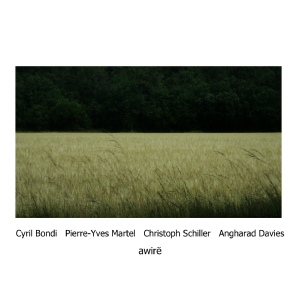Another Timbre TimHarrisonbre

at140 ‘awirë’ 30:12
Cyril Bondi, shruti box, pitch pipes, harmonica
Pierre-Yves Martel, viola da gamba, pitch pipes, harmonica
Christoph Schiller, harpsichord & preparations
Angharad Davies, violin
Recorded live at Cafe Oto, London, October 2018
Cyril Bondi, Pierre-Yves Martel and Christoph Schiller formed a trio in 2017 and recorded a set of studio pieces which became the CD ‘Tse’ (details here), which was released on Another Timbre in 2018. The CD was very successful and has nearly sold out. On the back of that CD, the trio did a brief tour of Europe in October 2018, and played at Cafe OTO in London together with violinist Angharad Davies. The trio played a set, followed by a solo by Angharad, and then for the final piece the trio joined forces with Angharad Davies and played as a quartet for the first (and so far only) time.
When working on their CD, the trio developed a way of working which offered a simple but very effective way of combining improvisational and composed elements. Christoph Schiller has an old tobacco tin which contains a number of small pieces of paper with musical notes written on them. Some of them contain a single note, eg ‘F’, while others contain up to four notes, eg Bb, E, C#, G. Prior to playing, the musicians lay out some of the pieces of paper in a sequence which they agree on. Each piece of paper represents up to, say, five minutes, during which the musicians only play the pitches on that piece of paper. After about five minutes they each move on to the next pitch or group of pitches, and stay with those for another five minutes and so on. In this way a piece of music emerges which has more coherence in terms of of pitch than is usual in free improvisation.
For the quartet performance with Angharad Davies at Cafe Oto the musicians agreed a sequence of notes, but left two of the pieces of paper blank, to allow those sections to be freely improvised. Although Angharad had never played with this compositional system before, she picked it up straightaway and the Cafe Oto performance was stunning. Fortunately it was recorded, initially just for documentation, but once cleaned up of street noises etc, the recording was good enough quality to be released as CD. It is a testament to the extraordinary creativity and wonderful collaborative abilities of the four musicians.